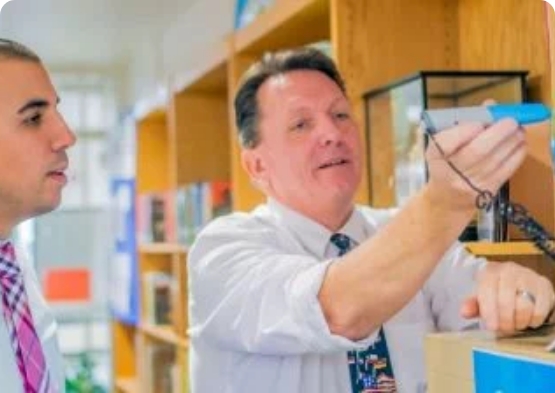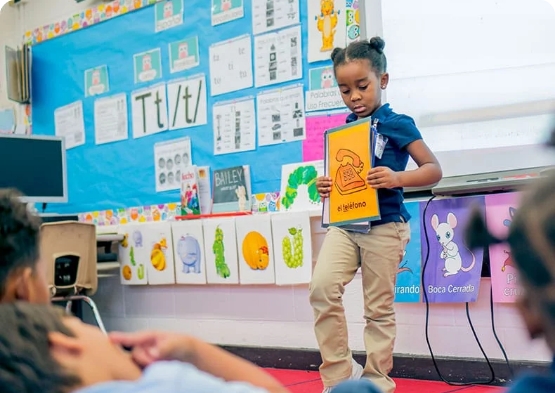
Global Leaders
The world, as we know it, is changing. Global Leaders prepares students to become globally-competitive for their future careers and success.

Why Global Leaders?
Global Leaders prepares students for a modern workforce by integrating global issues, current events, and global competencies into existing school priorities.
The students of today will be competing for the jobs of tomorrow, and a global approach to learning across grade levels and subject areas will ready them for their future careers. Global Leaders prepares students to successfully navigate the global marketplace and think critically about the world around them.
West Oxford Elementary School Case Study
Imagine a world where every child is empowered to become a global leader. This vision became a reality at West Oxford Elementary School when they launched the Global Leaders framework in early 2020.
Months of strategic planning culminated in an initiative that inspires and equips students to make a positive impact on their local community and beyond. The results speak for themselves: West Oxford has seen significant improvements in academic achievement, teacher retention and engagement, and community engagement.


How old do you have to be to change the world?
- Can first graders create solutions that address food insecurity in their local community?
- Can seventh graders improve the health and well-being of people halfway around the world?
At Participate Learning, we believe it’s never too early, or too late, to start thinking globally.
Why choose Global Leaders?
Global Leaders is a holistic framework that complements your existing school priorities. We provide the support schools need to ensure a global experience for all students and colleagues to help achieve the following goals:

Promote Career Readiness and Global Citizenship
We provide educators with the tools to promote student career readiness and global citizenship.

Prepare Students to Lead
Strategy coaches help teachers design action-driven learning experiences that prepare students to lead in a complex and changing world.

Create a Global School Culture
We empower administrators to lead a school community with a unified global focus.
Methods of Support
We provide the support schools need to ensure a global experience for all students and colleagues in their schools.

Professional Development
Implementation Strategies
Strategy Coaching
Exemplar Activities
Global Leaders Kit

Why Action-Driven Learning?
Action-Driven Learning supports academic skills and global competencies
Global Leaders is a framework that encourages academic learning with purpose. We call this action-driven learning.
Action-driven learning experiences support our students in building academic skills and global competencies while they take action towards a vision of a better world.



“
The more children learn about the world, the more they realize what is possible.”

All students need to know how to read, write, and do math, but they also need to know how to apply these academic skills in real-world contexts. This is what global citizens do.
Our partner schools develop students with the attitudes, skills, and knowledge to be global leaders–students who create solutions, tackle difficult problems, and affect change in their communities and beyond.
What does it mean to be a
Global Leader?
As students engage in global learning, they develop a combination of attitudes, skills, and knowledge that demonstrate ten core competencies. These competencies empower learners to pay attention to the world, feel connected to it, and take action to make it a better place.



Global Leaders School Designations
As teachers in our Global Leaders’ schools advance through their own learning, they progress through specific designations, each corresponding to a deepening of their skills as Global Leaders learners and educators.
At every stage of the Global Leaders journey, partner schools are recognized for their accomplishments. From banners to display in the school to social media campaigns and shout-outs, we work alongside our partners to highlight and celebrate successful implementation and progression.
Global Leaders Impact
Hear directly from some of our partners about the impact of partnering with Participate Learning to implement Global Leaders.
“
Teaching our students to be Global Leaders provides them with the opportunity to learn those soft skills, through both the Global Competencies and the Sustainable Development Goals … With these initiatives, we are creating Global Leaders who are well-rounded citizens; they are able to pay attention, feel connected, and take action! Global Education is allowing our students the chance to solve problems, make decisions, think critically, communicate ideas effectively and work well with others.”

“
Global Leaders and global education are so important to me because I want to be able to affect change in our Johnsonville community. Having an awareness of the world around them and the part they play in every community they belong to is so important for our young people. Through global education, our students are learning empathy, understanding, tolerance, respect for differences, and so much more. We are building better citizens every day through our work.”

“
The Global Leaders program has enriched the academic program for students [at our school]. Students have traveled through the world and developed a great sense of empathy for differences.”

Ready to experience the impact of global education at your school?
Fill out the form below and we will be in touch to answer your questions.



